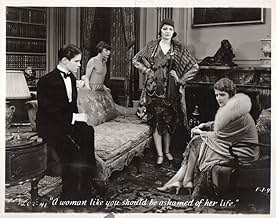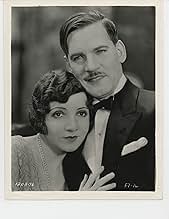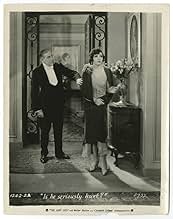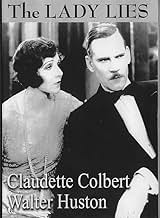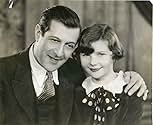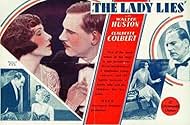Much to the disapproval of his snooty children, a wealthy widowed attorney takes up with a beautiful but "lower-class" woman.Much to the disapproval of his snooty children, a wealthy widowed attorney takes up with a beautiful but "lower-class" woman.Much to the disapproval of his snooty children, a wealthy widowed attorney takes up with a beautiful but "lower-class" woman.
- Awards
- 3 wins total
Featured reviews
Becoming aware of their father's affair, teenage children Tom Brown (as Robert "Bob" Rossiter Jr.) and Patricia Deering (as Josephine "Jo" Rossiter) decide to meet Colbert, who shares a New York apartment with Huston. Young Mr. Brown telephones Colbert with dire health news. To turn the tables on the tricky kids, Colbert tells them she and Huston's upcoming trip to Europe is also going to be a honeymoon. But, it's just a cruise. This is how "The Lady Lies" gets its title. The film is probably most interesting as a chance to see the then stage actress Claudette Colbert in an early starring appearance (showing plenty of profile).
**** The Lady Lies (9/21/29) Hobart Henley ~ Walter Huston, Claudette Colbert, Tom Brown, Charles Ruggles
As far as the plot goes, I think it's an example of a film which implies a lot without saying it...at least that's what I THINK was happening.
Rich guy Robert Rossiter (Huston) is a widower whose two kids were sent away to boarding school. In the meantime, Robert meets a nice working girl, Joyce (Colbert) and they fall in love. However, Robert's straight-laced family don't approve. Why? Well, that's the vague part. It might just be because she's not from the fancy set and the family are snobs. But it might also be implying she's become Rossiter's mistress...with all that implies. But frankly...I don't know. If it's the former, everyone REALLY overracts to the romance. If it's the latter, they sure didn't make it clear...and this lack of clarity is why I didn't love the picture.
Overall, an okay time-passer...that I really wanted to like more. And, while Huston and Colbert are very good, the actors playing the children are just awful...among the worst performances by child actors I can recall.
Robert Rossitor (Walter Huston) is a socially prominent guy and a well respected attorney with a lush of a pal who is always advising him against brunettes, and if it's 1929 and it's Paramount that drunken pal must be Charlie Ruggles, here playing Charlie Taylor. Rossitor is a widower and father to two children. At a local department store Rossitor is at the awkward task of buying a birthday present for his daughter. He is helped by sales clerk Joyce Roamer (Claudette Colbert) who helps give his gift the feminine touch Rossitor lacks. The two instantly click and the film fast forwards to two years later. Rossitor and Joyce have been enjoying a two year affair, but the topic of marriage is seldom brushed up against. It appears that Rossitor is paying for Joyce's apartment, because her digs are far too elegant to be paid for by a sales girl's salary. Charlie Taylor has set up part-time housekeeping next door as well, with blonde Hilda, whom he met in a bar and who basically set up the ground rules of their sugar-daddy relationship at their first meeting in a priceless precode discussion. Even though Joyce and Hilda look at their men quite differently, they have become best friends.
The trouble begins when Rossitor's children come home from boarding school and his New England relatives - the Tuttles - visit for dinner. This is where we get into this weird religion of the social register. Patriarch Henry Tuttle has the tone of a thundering preacher, but his words are along the lines of - we know about your girlfriend, our family tree is that of a giant elm, her's is a common shrub, stay in your own forest, your happiness doesn't count. Rossitor tells uncle Henry off in private, then Henry has the nerve to wait until Rossitor leaves the house and poisons the children's' minds against Joyce sight unseen with his very unsocial gospel.
When confronted with the fact that his children now know about Joyce and that they are dead set against any continuing relationship - even though they are all of twelve - Robert is now a double-minded man. He admits Joyce is a fine person, that she has shown him the only true happiness he's had since his wife died, yet he is a man beset with doubt as to whether or not he should break it off with Joyce and marry a woman he barely likes for the sake of appearances. How does this work out? Watch and find out. The performances here are quite natural for an early talkie, which is true for most Paramount talking films of that early sound era save the very first few that they made.
As for the weird attitude toward working people as though they are trash by Robert's New England relatives, this attitude is called Calvinism and the popular thought among the well-to-do of New England at this time was that if God liked you he showed His good pleasure by making you and your family rich, if He didn't you were poor. And if God didn't like you, why should the rich cut you any slack? How quickly the problems with this philosophy showed themselves after the Great Depression made so many rich people poor just a year or so after this film was made.
This was made just a few months after Walter Huston's debut film, GENTLEMEN OF THE PRESS but in terms of filmmaking its light years ahead. Compared with that earlier 'talker' this feels like it's made by professionals. It's no great classic but it's pretty good. In this Walter Huston (who was pretty awful in GOTP but now knows exactly how to act in a talking picture) plays an upper class widow who takes a shopgirl as his lover. Even though she is Claudette Colbert, not exactly your typical working class girl, that such a relationship could be anything more than a sugar daddy - gold digger situation is considered outrageous not just by his friends and snooty family but by her friends as well.
Without revealing the plot, even Huston's and Colbert's characters consider it impossible that they could possibly be in love and certainly contemplating marriage would be about as likely as moving to the moon. I was surprised just how rigid the social structure was portrayed to be in America - it seemed as bad as ours here in England. A couple of years later however their social structure would change forever when The Depression would put people of all classes in the same boat. Whereas the 30s seems like a different world, the 20s were a different universe.
The story is probably a little bit too removed from our lives to be that accessible to most of us today but certainly for 1929, it's remarkably well made (it's even got a musical score) so it's very watchable and entertaining. If you're interested in life in the 1920s, think that Walter Huston should have been President of the world or you're in love with Claudette Colbert, you will enjoy this.
As to the title of this review - As all good Genesis fans will know, The Lady Lies is the best track on their 1978 album, And Then There Were Three.
Did you know
- TriviaOne of the earliest of over 700 Paramount Productions, filmed between 1929 and 1949, which were sold to MCA/Universal in 1958 for television distribution, and have been owned and controlled by MCA ever since; its earliest documented telecast took place in Charlotte NC Monday 2 May 1960 on WSOC (Channel 9).
- Quotes
Charlie Tayler: Now, Hilda, you'll tell me the reason for getting me up in the middle of the night to come and have breakfast with you like this.
Hilda Pearson: Oh, Daddy, I have sad news for you.
Charlie Tayler: Oh, my goodness! What has Papa's little rustle of spring got to tell Papa?
Hilda Pearson: You lost four thousand dollars on the market today.
Charlie Tayler: Did you get me out of a nice warm bed to tell me that? How did this thing happen?
Hilda Pearson: Well, I switched my account over to your brokers. I thought it would be kind of clubby. You know, your account and mine right next to each other.
Charlie Tayler: Oh, that would be cosy and comfy wouldn't it? In other words, you mean that you're four thousand dollars short at my broker?
Hilda Pearson: Yes, and if four grand aren't there by the time the market closes, they'll sell your baby right out. You wouldn't want that to happen, would you, Daddy?
Charlie Tayler: Oh, no. Mamma knows Daddy wouldn't want that to happen. Tell me something, did you look me up in Bradstreet?
Hilda Pearson: You bet your life I did.
Charlie Tayler: And you found there was gold in them thar hills?
Hilda Pearson: Oh, Daddy...!
Charlie Tayler: Well do me a favour, don't try to get it all in one blad, will you?
- ConnectionsAlternate-language version of Une femme a menti (1930)
Details
- Release date
- Country of origin
- Languages
- Also known as
- 女は嘘つき
- Filming locations
- Kaufman Astoria Studios - 3412 36th Street, Astoria, Queens, New York City, New York, USA("Long Island Studios")
- Production company
- See more company credits at IMDbPro
- Runtime1 hour 15 minutes
- Color
- Aspect ratio
- 1.20 : 1
Contribute to this page


